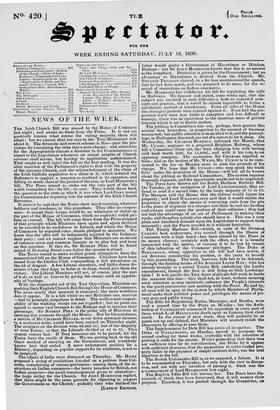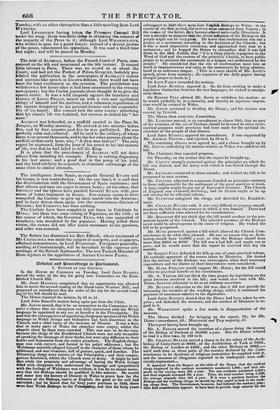NEWS OF THE WEEK.
THE Irish Church Bill was passed by the House of Commons last night ; and awaits its doom from the Peers. It is not yet positively known what course the ruling majority there will adopt ; but we cannot shut our ears to the Tory-Ministerial talk about it. The favourite and newest scheme is this—pass the pro- visions for converting the tithe into a rent-charge ; and substitute for the Appropriation-clauses a direction to the Commissioners to report to the Legislature whenever an actual surplus of Church revenue shall accrue, but leaving its application undetermined. They might as well reject the bill on the first reading. It was the dear assertion of the Parliament's right to deal with the property of the sinecure Church, and the acknowledgment of the claim of the Irish Catholic population to a share in it, which induced the Reformers to support a measure so confined in its operation, and falling so much short of the justice of the case, as Lord MORPETH'S bill. The Peers intend to strike out the only part of the bill worth contending for—its life—its soul. They would throw back the question to the state in which it was when Lord GREY issued his Commission for inquiring into the amount of the Irish Church Revenues.
It cannot be said that the Tories show much cunning, whatever boldness and insolence, in this procedure. They offer no compro- mise: to accept their terms, would be an admission of defeat on the part of the House of Commons, which no sophistry could pal- liate or conceal. The bill will come down from the Peers stripped of that principle which Ministers have again and again declared to be essential to its usefulness in Ireland, and which the House of Commons by repeated votes stands pledged to maintain. We know that the offer will be indignantly rejected by the Indepen- dent part •; and we cannot suppose that Ministers are so devoid of common sense and common honesty as to play fast and loose on this question. If they do, Sir ROBERT PEEL will be found seated in Downing Street even before the session is closed. The Tories intend to make another grand struggle to force the emasculated bill on the House of Commons. Circulars have been issued from the Carlton Club commanding a full attendance on the 2d of August. A few Liberal absentees, and half-a-dozen de- serters whom they hope to bribe or to dupe, would give them the victory. The Liberal Members will not, of course, play the part of fools as well as knaves by giving the enemy such an opportu- nity of 'vantage.
With the disgraceful aid of the Tory Opposition, Ministers are pushing their English Church Bill through the House of Commons. The more nearly that measure is examined, the more worthless does it appear. It is a bill which no real Reformer can sanction —bad in principle, iniquitous in detail. The welfare and respect- ability of the working clergy are not regarded ; but no pains are spared to secure vast incomes to the Bishops and to increase their patronage. Sir ROBERT PEEL is the prime ally of Ministers in carrying this measure through the House. But for his assistance,
a motion of Mr. CHARLES BULLER, to cut down episcopal incomes to a moderate scale, would have been carried on Thursday night.
The numbers on the division were 82 and 44 ; but of the majority 47 were Tories; so that the Liberals divided as 44 to 35. This system cannot last. If Tory measures are to be passed, let the Tories have the credit of them. We are getting back to the old GREY method of carrying on the Government, and everybody knows how that ended. A more unfortunate position for a Ministry, depending on popular support for its existence, is not to be imagined.
The affairs of India were discussed on Thursday. Mr. HUME a proposed string of resolutions founded on a petition from Cal-
cutta, complaining of various grievances ; among them, of the re-
strictions on Indian commerce—the heavy taxation for British, not Indian purposes—the small encouragement given to education— the large outlay for the Church. Sir JOHN HOBHOUSE replied, that there might be the same grounds for objecting to support the Government as the Church : probably they who disliked the [LATEST EDITION.
latter would prefer a Government of Mussulmen or Hindoos. Perhaps : but Sir JOHN HOBHOUSE knows that this is no answer
to the complaint. Protection is given by the Government ; but no advantage to Mussulmen is derived from the Church. Mr. POULETT Tiromsosr showed, in a far less unstatesmanlike speech, that he had done much, and was prepared to do more, for the re- moval of restrictions on Indian commerce.
Mr. MORRISON has withdrawn his bill for regulating the tolls on Railways. We foresaw and stated, some weeks ago, that the subject was involved in such difficulties, both as regarded prin-
ciple and practice, that it would be almost impossible to frame a satisfactory method of interference. From all sides of the House
the strongest protests were entered against it. Even had the pro- position itself been less liable to exception and less difficult to manage, there was no equivalent to the immense mass of private interest which it set in hostile motion.
The jobbing in Committees has not, perhaps, been greater this session than heretofore, in proportion to the amount of business transacted ; but public attention is more alive to it, and the proceed- ings in Parliament this week are not of a nature to let it sleep. On Wednesday, Sir CHARLES BURRELL informed the House, that Mr. CUNDY, engineer to a projected Brighton Railway, whose bill a Committee threw out, has been charging him with having sold land worth 2001. for 15,0001., and with it his vote, to an opposing company. The accusation Sir CHARLES repelled, as false ; and on the motion of Mr. WYNN, Mr. CUNDY is to be sum- moned to the bar on Monday next, to state the grounds of his
charge. We hope that Mr. CUNDY—who may speak the truth fully under the protection of' the House—will tell all he knows about the jobbing on Railroad Committees. The system requires thorough exposure, and the opportunity ought not to be neglected. The Peers have thrown out the South Durham Railway Bill. On Tuesday, at the instigation of Lord LONDONDERRY, they re- fused to read it a second time, by the large majority of' 51 to 19. The Marquis told the House that the railway would injure his property; and Lord WHARNCLIFFE said that it would enable the projectors to obtain the means of conveying coals from the pits to the place of shipment at a cheaper rate than he and his brother coal-owners could carry the produce of their collieries : they had not had the advantage of an act of Parliament in making their roads, and therefore nobody else should have it. This was a very plain and barefaced demand upon the Legislature to support their monopoly; and the Peers acceded to it without hesitation. The Trinity Harbour Bill—which, in spite of Sir GEORGE CLERK'S best endeavours, was carried through the House of Commons with a high hand—has been altered by the Peers in its money clauses; certainly with the effect, and it is broadly insinuated with the motive, of causing it to be lost by reason of this infraction of the Commons' privileges. The Duke of BUCCLEUCII, whose opposition to the bill had been active, if not decorous considering his position, is the party to benefit by this proceeding. The trick, however, bids fair to be defeated, through the dashing tactics of Sir ANDREW LEITH HAY; who has already brought in a second Trinity Bill, embodying the Lordly amendments, though the first is still lying on their Lordships table ! It will puzzle the Tory doers of private-bill-work to burke the measure this time : they shall not, at least, without securing such attention as may eminently subserve the People's interests in the great controversy now pending with the Peers. By and by, all eyes will be open to the system by which Members of Parlia- ment make their political power and privileges the means of pri- vate gain and public wrong. The Bills for Registering Births, Marriages, and Deaths, were read a second time by the Peers on Monday ; but the Arch- bishop of CANTERBURY announced his opposition to every part of them which Lod MELBOURNE dwelt upon as forming their chief merit. In the course of next week, they will probably be so much cut up and defaced, that Ministers will scarcely insult the Dissenters by offering to pass them. The Imprisonment for Debt Bill has received its quietus. The Duke of WELLINGTON, on Monday, moved to postpone the second reading for three weeks, avowedly with the intention of putting it aside for the session. Whilst pretending that there was not sufficient time for its consideration, the Duke let it appear with sufficient clearness, that the proposition to make landed pro- perty liable to the payment of simple contract debts, was the real objection to the bill. The Scotch Universities Bill is, as we expected, a failure. It is to be recommitted on Thursday, but only with the view to discus- sion, and not with any intention of passing it. Such was the ainouncement of Lord MELBOURNE last night.
The English Tithe Bill will become law. The Peers have dis- covered, or think they have discovered, that it will answer their purpose. Therefoie, it was pushed through the Committee, on
Tuesday, with no other obstruction than a little snarling from Lord
WYNFORD.
Lord LYNDHURST having takes the Prisoners Clause Bill under his wing, there was little delay in obtaining the consent of the majority of the Peers to it ; although Lord WHARNCLIFFE, who wishes to pass for a great lawyer instead of a decent justice of the peace, volunteered his opposition. It was read a third time last night ; and will be passed on Monday.



























